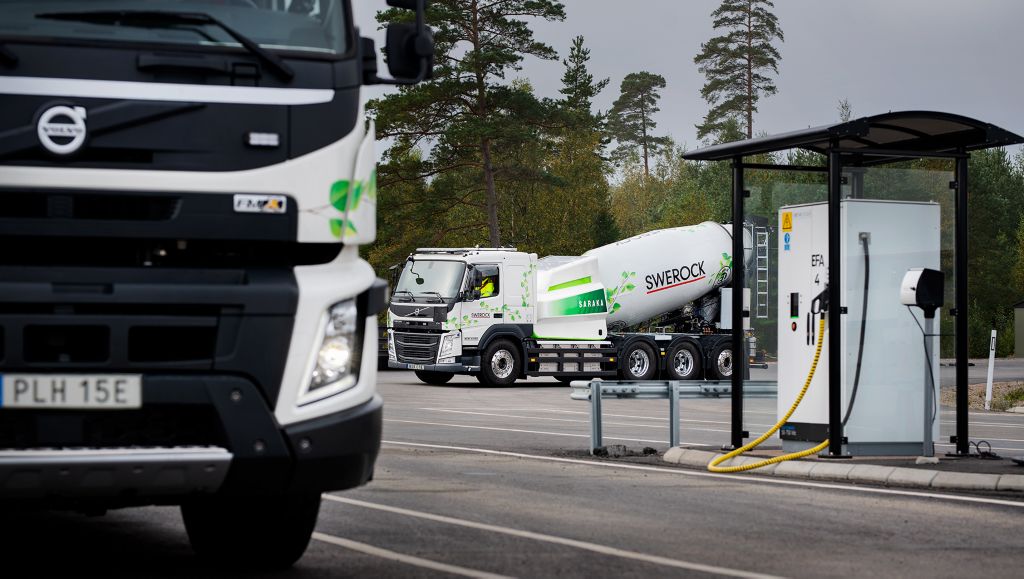Pilot testing of electric trucks in construction begins


For the next two years, a fully electric Volvo FM truck equipped with a mixer will be quietly moving through Gothenburg and its surrounds, delivering concrete to Swerock’s customers. At the same time, a fully electric Volvo FMX truck fitted with a hooklift will be put to work at some of the city’s larger infrastructure projects.
This will not only enable Swerock to reduce its environmental impact and fuel consumption, but also brings a host of other benefits for its business, its employees, its customers and society as a whole. For example: operating without exhaust fumes and noise means healthier working conditions, and greater flexibility to operate after hours in residential areas when noise restrictions normally apply.
Monitoring the electric FM and FMX trucks’ every move during the pilot is a team from Volvo Trucks. Apart from analysing the performance of the vehicles themselves, the tests will also look at the overall electromobility eco-system, to help find charging opportunities in line with demands on productivity. To this end, there will be both stationary charging stations and portable ones to suit the customer’s driving cycles and to maximize productivity.
These types of pilot tests are valuable for helping us to better understand the customer’s operations and how electrification will impact them on a day-to-day basis.
“These types of pilot tests are valuable for helping us to better understand the customer’s operations and how electrification will impact them on a day-to-day basis in terms of driving cycles, load capacity, uptime, range and other parameters – and with all the benefits of using quieter, cleaner transport,” says Ebba Bergbom Wallin, Electromobility Business Manager at Volvo Trucks.
Volvo Trucks’ partner in the pilot tests – Swerock – is one of Scandinavia’s largest suppliers of material and services to the construction industry, and also has a proven commitment to sustainability. It works extensively with the recycling of raw materials, such as producing eco-concrete, which replaces cement with slag from blast furnaces to significantly reduce its CO2 emissions. Swerock’s fleet also includes 15 hybrid concrete mixer trucks.
“This project suits us perfectly because we’re also working towards climate-smart solutions and it is part of our company policy,” says Hans Orest, Division Manager at Swerock. “In fact, it is becoming more and more common for our customers to demand reduced climate impact, which we think is really important. In particular public municipalities and county councils require this, but now even construction companies are following this trend too.”
The benefits of electric vehicles for urban environments will be measured in terms of zero local emissions, quieter transport, onsite safety as well as various aspects of driver comfort.
“We should not underestimate how stressful the noise and vibrations of the truck can be for the driver,” says Ebba Bergbom Wallin. “When we talk to drivers, they often comment on how quiet the electric trucks are and what a difference this makes. Given the current shortage of skilled drivers, being able to provide a better workspace will be a huge competitive advantage when it comes to recruitment and retention.”
The pilot tests will be ongoing for two years in order to evaluate the trucks’ performance during various seasons and through shifting weather patterns. One of the ambitions of the pilot is to support the development of a fully electric heavy-duty truck for the construction industry.
Facts: Volvo Trucks’ first electric customer test for the heavy-duty segment
About Swerock
Swerock is one of the largest Scandinavian suppliers of material and services to the construction industry, with over 360 quarries and 60 concrete factories. Swerock also works with recycling, in order to take responsibility for the climate and environment and reduce the extraction of new material. Swerock is part of the Peab Group which has around 17,000 employees and net sales of SEK 56 billion.